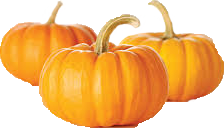|
It is one of the
vegetables which is very low calories; provides just 26 Cal per 100 g and
contains no saturated fats or cholesterol; but is rich a source of dietary
fibre, anti-oxidants, minerals, vitamins. Recommended by dieticians in
cholesterol controlling and weight reduction programs.
Pumpkin is a
storehouse of many anti-oxidant vitamins such as vitamin-A, vitamin-C and
vitamin-E.
With 7384 mg per
100 g, it is one of the vegetable in the cucurbitaceae family with highest
levels of vitamin-A, providing about 246% of RDA. Vitamin A is a powerful
natural anti-oxidant and is required by body for maintaining the integrity of
skin and mucus membranes. It is also an essential vitamin for vision. Research
studies suggest that natural foods rich in vitamin A helps body protect against
lung and oral cavity cancers.
It is also an
excellent source of many natural poly-phenolic flavonoid compounds such as α
and ß carotenes, cryptoxanthin, lutein and zeaxanthin. Carotenes convert into
vitamin A inside the body.
Zeaxanthin is a
natural anti-oxidant which has UV (ultra-violet) rays filtering actions in the
macula lutea in retina of the eyes. Thus, it helps protect from "age
related macular disease" (ARMD) in the elderly.
Rich in B-complex
group of vitamins like folates, niacin, vitamin B-6 (pyridoxine), thiamin and
pantothenic acid.
It is also rich
source of minerals like copper, calcium, potassium and phosphorus.
Pumpkin seeds are
good source of dietary fibre and mono-unsaturated fatty acids which are good
for heart health. In addition, they are very good in protein, minerals and many
health benefiting vitamins. For example 100 g of pumpkin seeds provide 559 Cal,
30 g of protein, 110% RDA of iron, 4987 mg of niacin (31% RDA), selenium (17%
of RDA), zinc (71%) etc... but no cholesterol. The seeds are an excellent
source of health promoting amino acid tryptophan. Tryptophan is converted to
GABA in the brain.
Boost Vision: A cup of cubed pumpkin contains almost twice the recommended
daily intake of vitamin A, which promotes good vision, especially in dim light,
according to the National Institutes of Health. It has also been found to slow
the decline of retinal function in those with retinitis pigmentosa, a
degenerative eye disease that can lead to blindness, according to researchers
from Harvard. Bonus: Vitamin A also helps form and maintain healthy skin, teeth
and bones.
Lower Blood Pressure:
Pumpkin seed oil is full of phytoestrogens, which research shows
are beneficial for preventing hypertension. When researchers fed rats a diet
supplement with the oil, they found that it helped lower both systolic and
diastolic blood pressure in just 12 weeks.
Sleep Better: Pumpkin seeds are rich in tryptophan, the amino acid that
contributes to post-Thanksgiving dinner sleepiness, says Virgin. Tryptophan is
also responsible for helping the body make serotonin, the feel-good neurotransmitter
that helps you relax and unwind. Not only do pumpkin seeds promote better
sleep, the serotonin will improve your mood, says Virgin.
Protect Your Package: Pumpkins — especially the seeds — are rich in beta-carotene
and other antioxidants with cancer protective properties. Pumpkin seeds could
be especially healthy for men. Researchers in Taiwan found pumpkin seed oil
blocked unhealthy prostate growth in male rats. A quarter cup of the seeds also
contains about 2.75 mg of zinc (about 17 percent of the recommended daily
intake for adults), which contributes to male sexual health. When young men in
a Wayne State University study restricted their dietary zinc intake, they had
significantly lower levels of testosterone after 20 weeks.
Have a Healthier
Heart: All that fibre can also help protect your ticker, research
shows. One Harvard study of over 40,000 male health professionals found that
those who ate a diet high in fibre had a 40 percent lower risk of coronary
heart disease, compared to those who ate a diet low in fibre. A more recent
study by Swedish researchers found that women who ate a diet high in fibre had
a 25 percent lower risk of heart disease compared with women who ate a low fibre
diet. Men benefitted less, likely because they’re more likely to get their fibre
from breads, while women are more likely to get their fibre from healthier
sources, like fruits and vegetables, the researchers write.
That means pumpkin-laced desserts won’t quite
cut it. For a healthier way to add pumpkin into your diet, adding pumpkin
chunks to a roasted vegetable medley, or sprinkling pumpkin seeds on top of
your salad. Feeling even more creative? Try pumpkin puree in place of nut
butters as a spread, Virgin suggests. And for an energizing morning smoothie,
blend a high-quality protein powder (like vanilla Daily Burn Fuel) with coconut
milk, chia seeds, pureed pumpkin and pumpkin pie spice.
|

